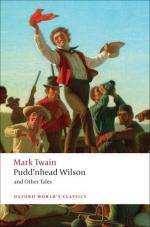’Must one report the offender and then beg his superior not to discharge him, but reprimand him and keep him?’
’No, that is not the idea; you don’t report him at all, for then you risk his bread and butter. You can act as if you are going to report him —when nothing else will answer. But that’s an extreme case. That is a sort of force, and force is bad. Diplomacy is the effective thing. Now if a man has tact—if a man will exercise diplomacy—’
For two minutes we had been standing at a telegraph wicket, and during all this time the Major had been trying to get the attention of one of the young operators, but they were all busy skylarking. The Major spoke now, and asked one of them to take his telegram. He got for reply:
‘I reckon you can wait a minute, can’t you?’ And the skylarking went on.
The Major said yes, he was not in a hurry. Then he wrote another telegram:
’President Western Union Tel. Co.:
’Come and dine
with me this evening. I can tell you how business
is
conducted in one of
your branches.’
Presently the young fellow who had spoken so pertly a little before reached out and took the telegram, and when he read it he lost colour and began to apologise and explain. He said he would lose his place if this deadly telegram was sent, and he might never get another. If he could be let off this time he would give no cause of complaint again. The compromise was accepted.
As we walked away, the Major said:
’Now, you see, that was diplomacy—and you see how it worked. It wouldn’t do any good to bluster, the way people are always doing. That boy can always give you as good as you send, and you’ll come out defeated and ashamed of yourself pretty nearly always. But you see he stands no chance against diplomacy. Gentle words and diplomacy—those are the tools to work with.’
’Yes, I see: but everybody wouldn’t have had your opportunity. It isn’t everybody that is on those familiar terms with the President of the Western Union.’
’Oh, you misunderstand. I don’t know the President—I only use him diplomatically. It is for his good and for the public good. There’s no harm in it.’
I said with hesitation and diffidence:
‘But is it ever right or noble to tell a lie?’
He took no note of the delicate self-righteousness of the question, but answered with undisturbed gravity and simplicity:
’Yes, sometimes. Lies told to injure a person and lies told to profit yourself are not justifiable, but lies told to help another person, and lies told in the public interest—oh, well, that is quite another matter. Anybody knows that. But never mind about the methods: you see the result. That youth is going to be useful now, and well-behaved. He had a good face. He was worth saving. Why, he was worth saving on his mother’s account if not his own.




